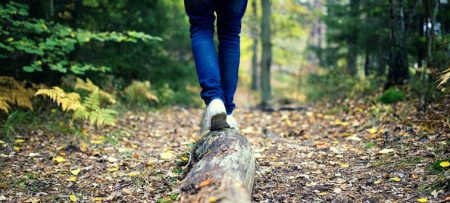Fresh air, peace and quiet, cute little animals; the idea that being in nature can make you feel good is hardly controversial.
But recent research led by the University of Exeter and published in Scientific Reports claims to have found the minimum amount of time we need to spend in a natural setting to feel these benefits. Using data from almost 20,000 people, this study found that those who spend two hours or more per week in natural spaces are significantly more likely to report good physical health and psychological well being.
This was the case regardless of age, sex, ethnicity or income level, and encompassed people with disabilities and chronic illnesses.
Reporters on Science Daily termed this the “120-minute threshold,” and it has the potential to make a big impact on our lives.
Nature: the latest and oldest medicine
In 2018 a meta-analysis of data from almost 300 million people by the University of East Anglia found that spending time in nature could reduce the risk of a wide range of health problems, including type 2 diabetes, preterm birth and cardiovascular conditions.
Not only that, it could also decrease the likelihood of developing depression and anxiety, two of the most widespread psychiatric illnesses in the UK, by lowering stress hormones. Meanwhile, leading mental health charity Mind reports that spending time in green space can improve self-esteem and trigger feelings of tranquillity.
Because of this, the use of ecotherapy is currently on the rise. This is usually a group activity led by a therapist in an outdoor setting, but it can encompass a wide range of approaches such as traditional talking therapy, art therapy and mindfulness. Ecotherapy is even beginning to be incorporated into treatment for physical illnesses, with the charity We Hear You collaborating with The Natural Self to run a programme for people with cancer, which was launched only a few weeks ago.
Is it human nature?
It’s difficult to say exactly why nature has this effect on us. On the one hand, it is likely that the majority of people who spend time in nature are active while they do so, whether they’re the neighbourhood’s dedicated park jogger or simply taking a stroll.
However, Exeter University’s study suggests that exercise isn’t the only way to reap the benefits of nature. People who reported benefiting from nature got their 120 minutes a week in many different ways, some knocking it out in one long session while others added up several shorter visits over the week. This could include activities such as gardening and dog-walking, or even simply sitting outside to eat lunch.
According to Professor Terry Hartig, who co-authored the research, reasons for the positive effect of nature on health could include “getting perspective on life circumstances, reducing stress, and enjoying quality time with friends and family.” And if you want to get really technical about it, a 2015 study by Stanford University found that walking in a natural setting can decrease neural activity in the subgenual prefrontal cortex, a part of the brain associated with mental illness. The same effects were not found in those who walked in an urban setting.
Could there be something fundamentally therapeutic about nature? Quite possibly. Regardless, the bottom line is that spending time in the natural world can help you live longer and feel better.
It’s not as hard as you might think
The 120 minute threshold has the potential to be a crucial discovery because it gives us a target and, unlike many (allegedly) health-related targets, it isn’t about weight, rules or self-flagellation.
Plus, the 2 hour benchmark leaves a lot of room for manoeuvre in terms of how that time is actually spent. With medical science starting to lean more towards a personalised approach to treatment, this could be the kind of flexible guidance that shapes the future of public health.
And no, you don’t have to kayak through Cambodia or drive for hours to find a forest to experience nature. In fact, the majority of nature visits reported in the Exeter University study took place within two miles of home, even when respondents lived in urban areas.
It also doesn’t have to be expensive. In fact, going for a jog or walk along a nature trail or around a local park instead of buying a gym membership could actually save you some money. There are also plenty of ways to work outdoor time into your day, such as by eating outside or taking the scenic route to work. If all else fails, simply sitting by the window or buying a few indoor plants can provide a connection with the outdoors.
Experiencing nature, saving nature
The benefit of the natural world on our physical and mental health is not new knowledge, but conserving natural spaces and wildlife seems all the more important now that there is a numerical figure to put on it.
As a race, humans need nature. Our physical and mental health depends upon it. Luckily, there are ways that we can reap the benefits of experiencing nature while also helping to keep it safe.
Beach, park, and forest clean ups are gaining popularity as young people call out against climate change more than ever before. Not only do these place you in a natural setting, they’re also a great way to socialise and can be done almost anywhere.
Volunteering on a conservation project abroad can also be an amazing gateway to experience nature while preserving it, but unfortunately this can be quite pricey. Plus, although adopting a furry friend may be a common dream, many young people don’t have the time, money or space to do this.
But interacting with animals doesn’t have to be expensive. Pet-sitting and dog-walking can be a fairly lucrative side hustle, and there can be little more adorable than ‘socialising kittens’ (a real job!) as a volunteer at a local animal shelter.
In an age where most of our lives take place indoors or behind a screen, it isn’t surprising that many of us struggle to make time to appreciate the natural world, or simply don’t know how. As a born-and-bred Londoner, I’ve definitely had weeks go by where I’ve not walked on or touched anything that wasn’t man-made, except my cat.
Yet the benefits of spending time in nature are apparent. Much research around this only proves what is in many ways common sense, but the 120 minute threshold may provide a very useful target, encouraging us to take time out to look after ourselves and the natural world.
More than anything, it reinforces a fundamental truth: we need nature.









